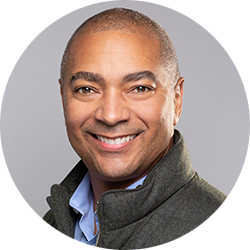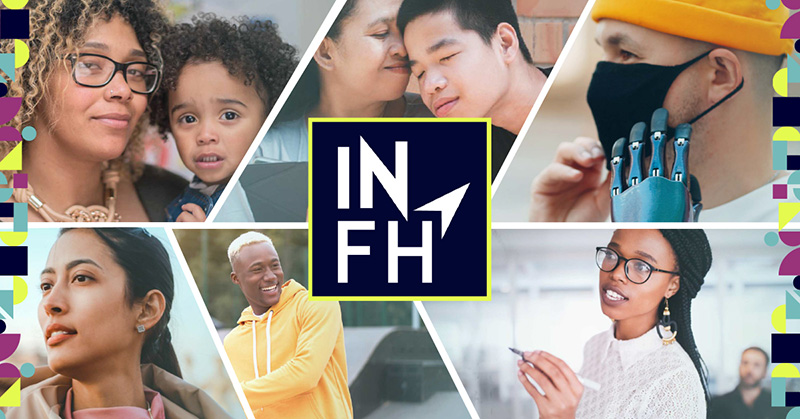The spark for In Full Health came from the American Medical Association’s strategic plan to embed racial justice and advance health equity, and we strive to create a framework for shared understanding about issues of equity in health innovation.
 One year later, and we have:
One year later, and we have:
Launched the Equitable Health Innovation Solution Development Toolkit
Featured over 35 health solutions developers, investors, and leaders on the In Full Health blog
Established the IFH Principles For Equitable Health Innovation as a foundation for many other organizations and conferences to approach this issue
Developed a robust Business Case For Health Equity

Chris Gibbons, MD, MPH (he/his) is the Founder and CEO of The Greystone Group. He is also a member of the American Medical Association’s External Equity & Innovation Advisory Group.
 Michael Penn MD, Ph.D. (he/him) is a Founding Partner for Health Equity Ventures, and is the Interim Director of Health Equity & Innovation for the AMA Center for Health Equity.
Michael Penn MD, Ph.D. (he/him) is a Founding Partner for Health Equity Ventures, and is the Interim Director of Health Equity & Innovation for the AMA Center for Health Equity.
In Full Health (IFH): First, why is an initiative like IFH so important?
Dr. Chris Gibbons: The biggest reason an initiative like In Full Health is so important is because the problem is so important. The lack of diversity and equity in health innovation affects so many people.
Dr. Michael Penn: From the perspective of users and patients, I sort of imagine being able to look them in the eye and say that the AMA and In Full Health are working to ensure that health innovations serve you and meet your needs. There’s a big gap to close and the idea of inclusive innovation is meant to benefit not only innovators and investors — but patients, too.
Dr. Chris Gibbons: The problem of inequities in health and healthcare, and specifically inequities in how health innovations get funded — those problems have been known for a while. What In Full Health has done is brought together a significant number of people across the country from diverse backgrounds to think about these problems in a more rigorous and consistent way.
![]()
Community Connections
I want to thank the AMA. The AMA has prioritized and funded this initiative. I would also like to say that none of this could be sustained without the commitment of Gina Hess and the partnership with Dr. Aletha Maybank. There are so many amazing people and organizations and collaborators who make this work possible. We couldn’t be more delighted.
Michael Penn, MD, Ph.D.
Interim Director of Health Equity & Innovation, AMA Center for Health Equity | Founding Partner, Health Equity Ventures
IFH: What has In Full Health achieved in its first year? What are you proudest of accomplishing?
Dr. Chris Gibbons: With the Principles for Equitable Health Innovation, we’ve employed a dedicated, systematic way of thinking about this problem. We’ve developed an articulated common language we can all use to have meaningful conversations and enact real change.
With the Business Case, we have created an evidence-based document for people who need to be able to justify this work in their own organizations or funds. More equity in the health innovation pipeline isn’t just the right thing to do. It can be a good thing to do and at the same time be very good for your return on investment or for your bottom line.
And third, we have collaboratively put together the first-ever, evidenced-based, methodology to help both health solution innovators and funders develop tools that won’t exacerbate existing inequity or create new ones. The Equitable Health Innovation Solution Development Toolkit can help ensure that the health innovation products or services they are building are meaningfully advancing health equity.
Dr. Michael Penn: I want to take a second to look at accomplishments from a big picture, a sort of 50,000-foot view. If you zoom out and look at where the industry is moving, you start seeing some interesting phenomena.
- The HLTH and Vive conferences now explicitly focus on these principles. We met recently at the Vive conference, and the In Full Health principles will serve as the foundation for that effort moving forward.
- The Health Foundation recently started a techquity initiative, and the AMA is a member of this coalition.
- Startup Health, the largest healthcare investor accelerator, globally, just launched a health equity moonshot, and our principles are going to be the basis of what they do at Startup Health.
At a national scale, more and more health leaders are realizing that this is an important problem that needs to be addressed. We’re seeing some significant uptake of the principles and the toolkit. Momentum is really increasing, people are taking note, and it’s expanding beyond us.
SUBSCRIBE
Stay in the loop about new blog posts from equitable health innovation leaders, helpful resources and tools to help you bring the Principles to life, upcoming events, and more by joining our email list.
SUBSCRIBEIFH: What do you hope to see from IFH in the future? What do you hope it will achieve?
Dr. Michael Penn: I would love for our growth to include expanding the categories of audiences that we bring the toolkit to. For example, how can the toolkit be used by health plans that make coverage decisions about digital and database tools? How can we connect with limited partners and engage them in conversations about equitable investment kind of ecosystem in healthcare? And lastly, what are the policy implications of this work, and how can In Full Health think more systemically about affecting policy decisions?
Our intent is to raise awareness, introduce more audiences to these principles, and begin the dialogue around how we make decisions about digital innovations we support, invest in, and implement.
Dr. Chris Gibbons: I hope that more of what’s happening continues to happen. I hope more people become aware and then decide, “Hey, this is the right thing to do. We want to use these principles, and make them the basis of what we do.” I hope our impact and reach continue to exponentially grow.
As more people make changes to the way they do things in health innovation, I hope we begin to see actual evidence of shifts in financing, purchasing, and equity investments. While it may be a little early for that right now, I want In Full Health to continue moving the needle on where people are investing and in what.
![]()
Expressing Gratitude
There are many, many people out there working day and night to reduce health disparities and make health innovation more equitable. And they are doing so without getting recognition. I want to hold them up. I want to say don’t give up. I want to say keep going, keep pressing forward, even when it doesn’t look like progress is being made. We may lose a few battles, but we’re winning the war.
Chris Gibbons, MD, MPH
Founder and CEO, The Greystone Group | Member, AMA External Equity & Innovation Advisory Group
IFH: How can health solutions developers, innovators, or investors get involved with IFH in 2023?
Dr. Michael Penn: The image that comes to mind is a mail person literally delivering the principles and the toolkit. If you think about all of the stakeholders that actually care about innovation in the country, that’s an opportunity for us to deliver the package to so many people. We can each deliver the package to all of the healthcare investors with whom we have relationships.
Whether you are an In Full Health collaborator, founder, or member of the Learning & Action Community, all of us to some degree work for the In Full Health post office, and we’re the ones who are delivering the packages.
This has to be a collective and communal effort. It can’t just be In Full Health. It has to be In Full Health and health conferences and state governments and investors and developers. And if you care about equity and health innovation, but aren’t yet a part of the post office — to continue the metaphor — join us. It has to be all of us.
SUBSCRIBE
Stay in the loop about new blog posts from equitable health innovation leaders, helpful resources and tools to help you bring the Principles to life, upcoming events, and more by joining our email list.
SUBSCRIBE


Comments are closed.